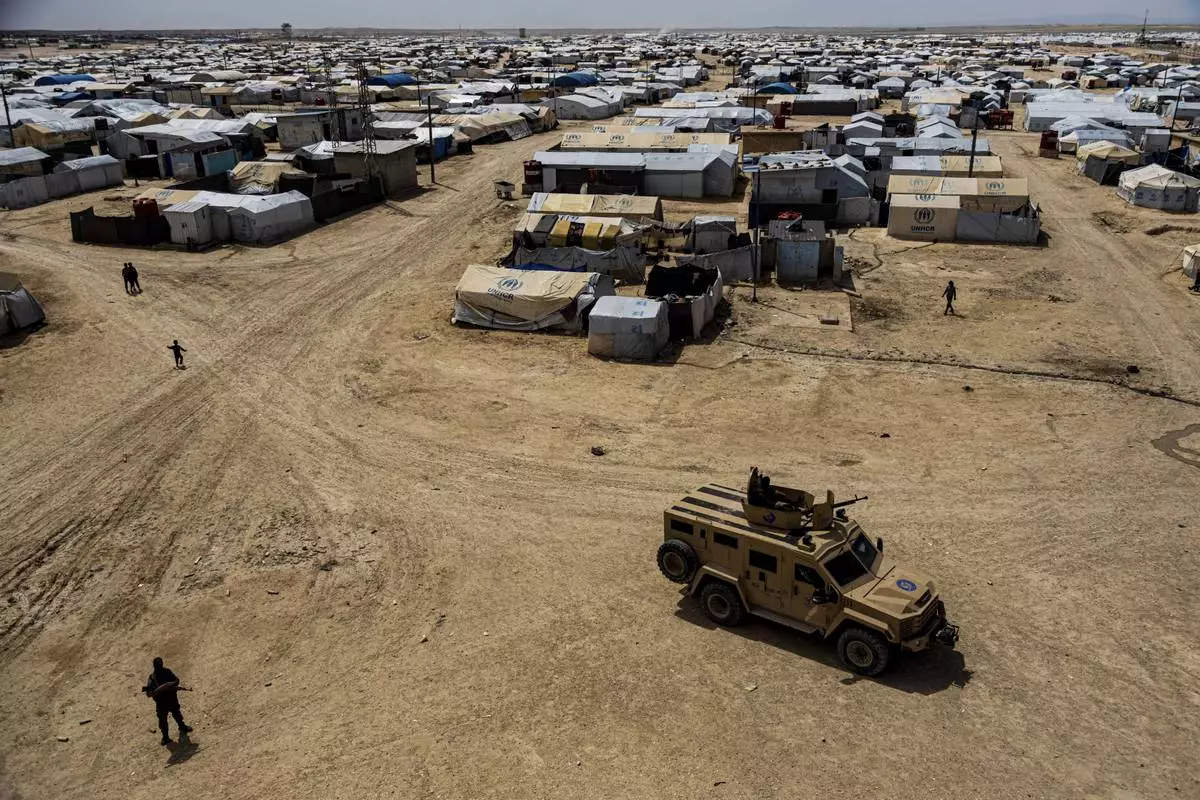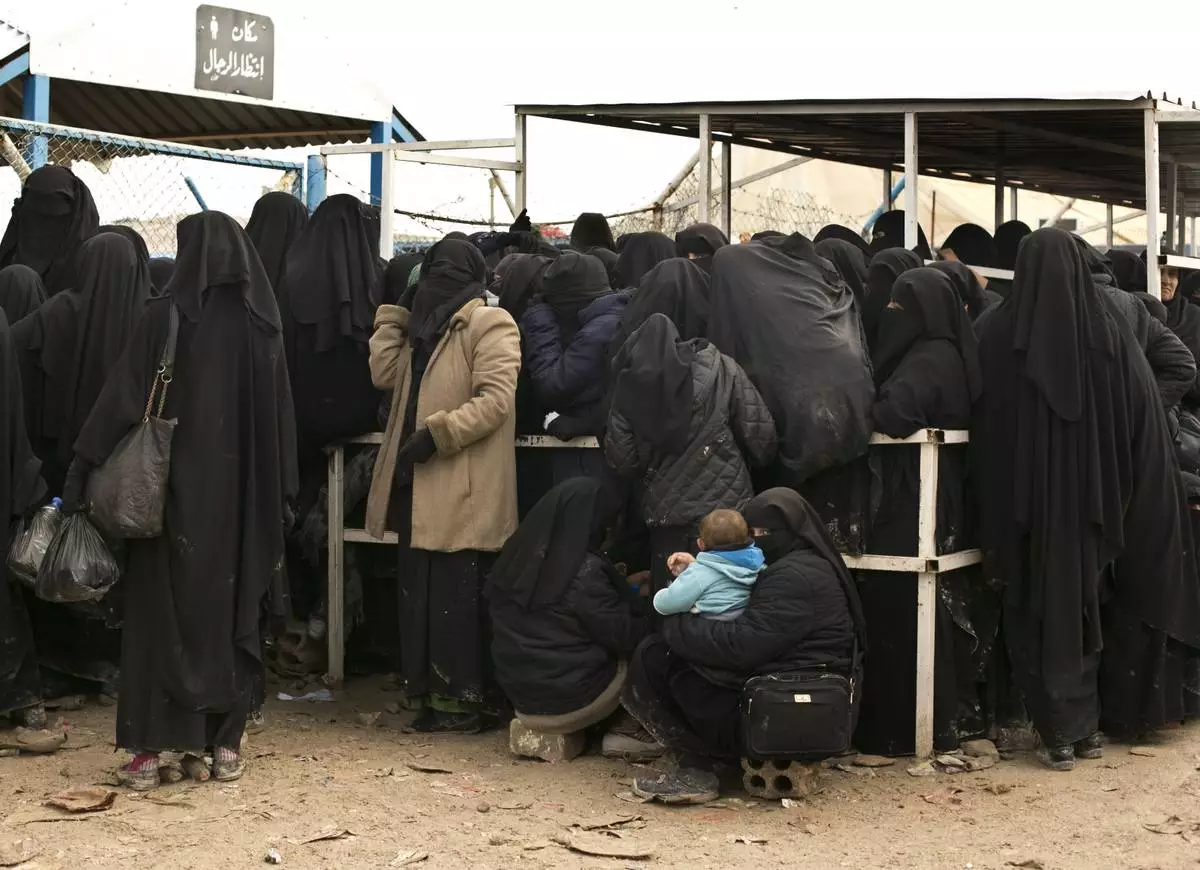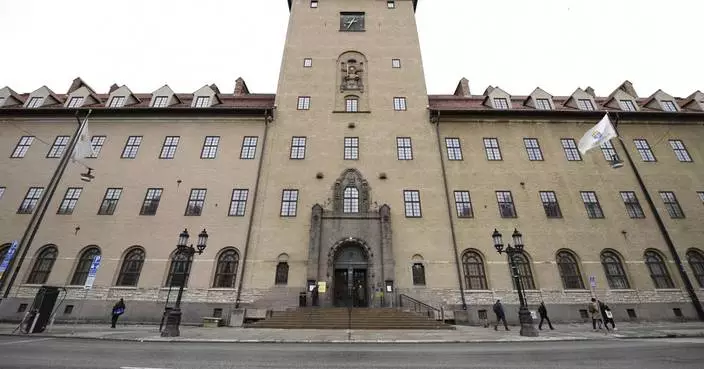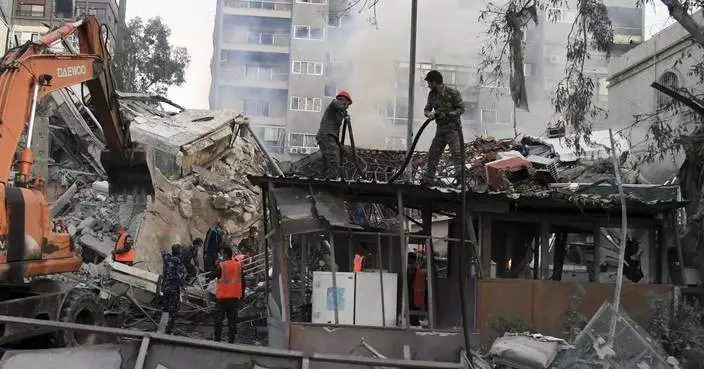Turkey's president said Tuesday that his troops will establish a 20-mile-wide "safe zone" in northern Syria, adding that Turkey would seek logistic and financial assistance from the United States and other allies to create the zone.
The announcement by Recep Tayyip Erdogan came as the United Nations' new special envoy for Syria arrived in Damascus, his first visit to the war-torn country since he took over in January.
Erdogan told his ruling party legislators in Parliament that the zone would keep "terrorists out," protect civilians and stem the flow of refugees.
Erdogan and President Donald Trump discussed the issue in a telephone call late Monday that apparently aimed to ease tensions after the U.S. president tweeted a threat to Turkey warning of economic harm should Ankara attack U.S.-backed Kurdish forces in Syria.
Ankara considers the Kurdish forces in Syria terrorists aligned with a Kurdish insurgency within Turkey's own borders.
Erdogan said the two leaders reached an "understanding of historical importance."
In Damascus, Geir Pedersen, the new U.N. special envoy for Syria, said he hopes to have productive talks with Syrian officials. He spoke briefly to reporters upon his arrival at the Four Seasons hotel after driving from neighboring Lebanon. The veteran Norwegian diplomat took over from Staffan de Mistura, who stepped down for family reasons after four years and four months of peace efforts that led nowhere.
"I hope we will have very substantial and productive talks and look forward to talking to you more after my discussions," Pedersen said. His office tweeted that he is looking forward to productive meetings in Damascus.
Syria has said it will cooperate with Pederson if he avoids the "methods" of his predecessor and commits to Syria's territorial integrity.
Nearly half a million people have been killed in the seven-year civil war in Syria and various U.N.-led peace efforts and indirect talks between the Syrian government and opposition in Geneva ended in failure.
Most recently, de Mistura was working on setting up a committee meant to draft a new constitution — a key step in ending the country's civil war. He said objections from the Syrian government were holding up the committee's launch. In his farewell U.N. briefing last month, he said "an extra mile" is needed to form the committee because a list of participants submitted by Russia, Iran and Turkey is unacceptable to the United Nations.
Pedersen has served the U.N. in various roles including as special coordinator for Lebanon in 2007-2008. He was a member of Norway's team that negotiated the 1993 Oslo accords, which resulted in mutual recognition between the Palestine Liberation Organization and Israel, and was Norway's representative to the Palestinian Authority between 1998 and 2003.
BEIRUT (AP) — Amnesty International said Wednesday it has documented widespread abuses, including torture and deprivation of medical care, in detention facilities holding thousands of suspected Islamic State members and their relatives in northeast Syria.
The centers and camps hold about 56,000 people — the majority of them children and teens — and are run by local authorities affiliated with the U.S.-backed, Kurdish-led Syrian Democratic Forces. The SDF and its allies, including U.S.-led coalition forces, defeated the Islamic State group in Syria in 2019, ending its self-proclaimed Islamic “caliphate” that had ruled over a large swath of territory straddling Iraq and Syria.
What to do with the suspected IS fighters and their families has become an intractable issue. Many countries whose citizens traveled to Syria to join IS have been reluctant to repatriate them, as have local communities in Syria.
"People held in this system are facing large-scale violations of their rights, some of which amount to war crimes,” Nicolette Waldman, Amnesty’s senior crisis advisor, told journalists.
The United States is also responsible for the alleged violations because it played a key role in establishing and maintaining the detention system, providing hundreds of millions of dollars to the SDF and affiliated forces and regularly interrogating detainees, Waldman said.
The human rights group interviewed 126 people accused of IS affiliation currently or formerly detained, along with representatives of the local administration and aid workers.
The Amnesty report said the vast majority of detainees are being held “indefinitely, without charge or trial, in violation of international human rights law and international humanitarian law,” while those who have been tried were, in many cases, convicted on the basis of confessions extracted under torture.
The alleged abuses include “beating, stress positions, drowning, electric shocks and gender-based violence,” including a male detainee who said he and others had been sodomized with broomsticks by guards, the report said. Detainees were also deprived of food, water and medical care and subjected to extreme cold and heat in overcrowded cells, with some allegedly dying of suffocation, it said.
The report added that many of the approximately 14,500 women and 30,000 children held had been victims of human trafficking, including women who were forced to marry IS fighters and minors who were forcibly recruited by the group, and that local authorities had failed to set up a “mechanism to identify trafficking victims” and protect them.
The report also criticized the practice of forcibly separating adolescent boys — some as young as 11 or 12 — from their mothers and placing them in rehabilitation centers indefinitely.
Amnesty called on local authorities, the U.S. government and other allies to bring the detention system into compliance with international law and urged the United Nations to work with them to establish a screening process to release all who are not “reasonably suspected” of having committed a serious crime.
The Autonomous Authorities of the North and East Syria Region, the civilian administration affiliated with the SDF, wrote in response to the Amnesty findings that it had not received any official complaints regarding torture in detention facilities and “if this happened, they are individual acts.”
The administration said it would take action against employees who committed violations if evidence is provided. It denied allegations that inmates were deprived of food, water and medical care. It acknowledged overcrowding in the facilities, which it attributed to lack of financial resources to secure larger centers.
The local authorities took issue with the allegation that people were arbitrarily detained, asserting that most detainees “are members of a terrorist organization and were arrested during the battles" and that many had committed crimes against humanity and war crimes.
The U.S. State Department said in its own response that “we share many of (Amnesty’s) concerns” and it has been working to address them. It called on the international community to “aid local entities’ management of these challenges” and for countries with citizens held in detention in Syria to repatriate them.
Waldman said she believes Washington "very likely knew about these poor conditions from the beginning."
She added: “We think that it may not be the case that they are doing everything they can. They need to accept a much greater responsibility, especially since they played such a key role in establishing the situation in the first place."

FILE - Kurdish forces patrol al-Hol camp, which houses families of members of the Islamic State group in Hasakeh province, Syria, on April 19, 2023. Amnesty International said Wednesday, April 17, 2024 it has documented widespread abuses, including torture and deprivation of medical care, in detention facilities holding thousands of suspected Islamic State members and their relatives in northeast Syria. (AP Photo/Baderkhan Ahmad, File)

FILE - Women residents from former Islamic State-held areas in Syria line up for aid supplies at Al-Hol camp in Hassakeh province, Syria, March 31, 2019. Amnesty International said Wednesday, April 17, 2024 it has documented widespread abuses, including torture and deprivation of medical care, in detention facilities holding thousands of suspected Islamic State members and their relatives in northeast Syria. (AP Photo/Maya Alleruzzo, File)











